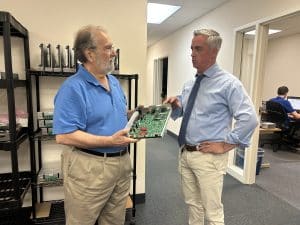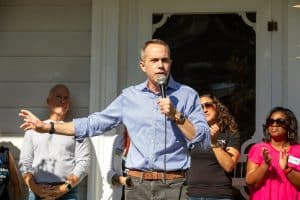During this time of great polarization between right and left, we need clear heads who can identify the key problems our country faces, and offer — if not a prescription for the future — at least a prioritized list of helpful action areas. One such clear head is New York Times columnist David Leonhardt, who offers a well-reasoned, easy-to-read, and moderate way forward in his new book Ours Was the Shining Future: The Story of the American Dream.
Leonhardt’s recommendations are based on a broad analysis of American history from the 1920s to the present. The book is organized around three questions:
– Why did our standard of living rise from throughout the Depression, World War II, and the Eisenhower Years?
– Why did it decline beginning with the Reagan administration?
– What can we do to return to at least the living standard of the post-War period?
He shows how the rise in Americans’ living standard occurred along with an increase in equal access to opportunity. His most trenchant example is that the enlarged influence of unions from the Depression to the Reagan administration increased the income of blue-collar and other low wage workers and reduced the income gap between the middle and upper classes. The progressive income taxes of the mid-20th Century enhanced this equity. So did government actions to build the economy, including creating the interstate highway system and investing in the research and development that contributed to American domination of the world economy. The Civil Rights movement guaranteed equal opportunity for a variety of minority groups without reducing the income of others. The social movements of this era were largely patriotic and inclusive, inviting blue-collar workers to participate in politics, although they were not always as open minorities.
Beginning in the 1960s, the intellectual atmosphere became more laissez-faire and exclusionary. On the right, this change was led by Milton Friedman, Robert Bork and lobbyists for laissez-faire capitalism, low taxes, and small government. These positions were adopted by able politicians who—with actions like Ronald Reagan’s smashing the Air Traffic Controllers’ strike—shrank the contribution of government to the general welfare and increased inequities in the tax code.
On the left, old movements, like unions, began to focus more on the needs of their current members at the expense of the larger working class. Newer social movements, like the women’s movement at the time, had a white, middle-class bias that often excluded women of color and the poor. These changes increased salary inequity and reduced life expectancy so that ours is lower than any other wealthy, developed nation.
Leonhardt’s prescriptions for the future challenge both the left and the right. They include:
– More investment in public services from education through support for transportation (trains, Air Traffic Control etc.),
– Sensible limits to immigration which not only creates burdens for border and urban areas but also threatens the income of the poor and working class,
– A liberal intelligentsia that is more open to the non-college educated, less focused on political correctness, and more attuned to the bread-and-butter issues facing a whole range of single mothers, legal immigrants, and others in the lower income brackets.
Neither conventionally progressive, nor Reagan conservative, nor MAGA, this book offers an insightful analysis of the issues our country faces today and suggestions for a way forward that are grounded more in historical analysis than ideology or what is popular in the polls. It’s definitely worth the read.







